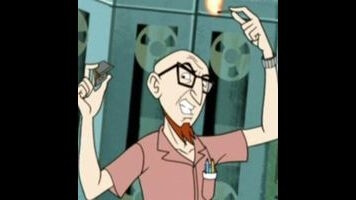One of the main reasons for The Venture Bros. continued success is the specificity of its references. While the show is willing to go for the obvious target when appropriate, Jackon Publick and Doc Hammer have a deep abiding love for a very specific brand of nerd culture—and I hesitate to even call it “nerd culture,” given how personal it seems to be. When St. Cloud monologue about how the red ball he stole from Billy Quizboy and Pete White basically helped create the present, the touchstones he references paint a certain picture. It’s not something everyone will directly relate to (confession: I really can’t stand John Hughes movies), but the passion that drives the writing, as self-aware and funny as it is, makes it universal. In an age where “geek” has come to be an increasingly generic term, there’s something refreshing about how little the show has changed its vision.
Other things have changed, though. I’m sure I’ve mentioned this before, but watching “Maybe No Go,” i was again struck by how genial the series has gotten in its age, how warmly affectionate it’s become towards all its characters. In earlier seasons, the Pirate Captain’s addiction to tranquilizers would’ve been a mean-spirited, though funny, bit. Now, though, Publick and Hammer (the latter of whom wrote this script) get a fair amount of laughs out of the material before using a Trainspotting reference to bring the PC back to his old, sensible self. It’s not soft, exactly, and it’s entirely possible that the captain will relapse, but just the fact that he’s allowed this small measure of dignity feels relatively new.
It’s a trend that only become obvious in season five, and it feels like a natural evolution for the show. To a certain extent, this robs the comedy of some of its bite. There’s the occasional shocking moment (like, say, the Monarch’s overly specific description of the results of his love making), but no one makes choices so self-centered or cruel that they seem irredeemable. Rusty’s ineptitude with the company Jonas left him feels inevitable, and his confessed dreams of “super science” fit in neatly with the show’s obsession for reaching towards an impossibly optimistic future. Yet that confession also makes his bad choices seem almost noble, and his willingness to adapt those choices on Dean’s suggestion is light years away from the Rusty we saw in the first couple of seasons.
I’m not complaining; I’m sure it’s possible that a crueler show might have a greater sense of stakes, but at this point, it seems important for us to just be able to enjoy the ride. And “Maybe No Go” is crazy enjoyable, balancing three plots (give or take) with ease, moving various on-going storylines forward and even slipping in some oddly moving thematic material. We learn that the super team demanding protection money from Rusty last week actually works for Wide Wale, and when Fallen Arches is unable to deliver the full amount they owe Wale (real name: Chester Ong), he decides to take the fight to Venture directly, with (for him) disastrous results.
We also find out that the Monarch is no longer a powerful enough villain to be considered worth of arching Venture, who’s gone up in the world. (My assumption that Dr. Mrs. The Monarch would be working for Wale may have been wrong, although that doesn’t explain why he was so touchy-feelie last week.) Monarch’s response, in typical Monarch fashion, is to take Gary and start shaking down the villains ahead of him in line. The results are not promising—they manage to take down Redusa, but it’s doubtful if the take down will last—but this is still the closest the show has right now to a plotline with actual urgency. Fun as it is to watch Guild politics, the Monarch is someone who’s been with the show since the beginning, and getting him back at Rusty’s throat is a lot easier to care about than, say, who’s going to betray the Council of Not Quite Thirteen next.
Out of everything, though, it’s Billy and Pete who have the most surprisingly moving arc, one that starts with a great joke (rescheduling a super-hero/super-villain battle over a dentist appointment), and ending on Billy’s impassioned speech about the importance of a bouncing red ball. That speech is at once pathetic and inspiring, and if there’s a better way to summarize what this show has come to stand for—the way optimism is, at heart, a special form of nerdery, of believing in something bright and shiny and ridiculous against all possible scorn—I’m not sure I’ve heard it.
Stray observations
- “You can’t put mouthwash into cookie batter!” -Billy
- “I was attempting the vernacular of the streets, trying out ‘New York Rusty.’” -Doc
- St. Cloud uses the Henrietta Pussycat puppet from Mr. Roger’s “Neighborhood Of Make Believe” as a washcloth. Billy freaks out over this, and I gotta say, it’s a surprisingly upsetting concept.
- “Is that me poop bucket over there?” “Very much so.” James Urbaniak hasn’t had a lot of screentime with Rusty this season so far, but his line readings are still choice.
- So, Billy and Pete are going to be part of Rusty’s super science dream team. I’m going to enjoy the time I have left to pretend that won’t be a disaster.

 Keep scrolling for more great stories.
Keep scrolling for more great stories.
